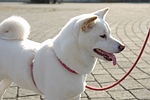Dog Problems and Solutions
In the good old days Palisades dogs ran free, and few people complained. But times have changed; as a result of the growing population of both dogs and people, the situation has become much more complicated. One can understand why dog owners want freedom for their animals. Unfortunately, sometimes this freedom impinges on the property rights, safety, and peace of mind of other residents and their pets.
The Town of Orangetown has a strong Dog Law, (see below) which can be used by any resident who has a complaint about their neighbor’s dog. To do this, call the Orangetown Police Department and ask to speak to the Dog Control Officer, or file a complaint directly with a Town Justice.
There is also a New York State Dangerous Dog Law which really has teeth. Once a dog is judged dangerous, as the result of an attack on a person or pet, a judge can order it evaluated by a veterinarian, confined, muzzled, spayed, or euthanized. The owner can be fined or imprisoned. You can find this law by Googling N.Y. AGM. LAW § 121 : NY Code - Section 121.
I spoke to Sergeant Sullivan at the Orangetown Police Department about the term in the Orangetown law “under the full control of such owner.” He told me that the fact that a dog has attacked another animal or threatened a person in the past would be a strong indication that it would be wise to keep that dog on a leash in the future.
Several years ago my mother was harassed a number of times by a neighbor’s dog as she walked on Corbett Lane. We took the owner to court three times, and he was eventually threatened with jail unless he could keep the dog from running free. The problem stopped. I hope that our current dog issues can be resolved without such drastic measures, and before a person or pet is injured. However, the tools to protect yourself from dogs running at large already exist, and if reasonable requests get you nowhere, you can use them.
“CODE OF THE TOWN OR ORANGETOWN, NEW YORK: CHAPTER 9, DOGS
It shall be unlawful for any owner of any dog in the
Town to permit or allow such dog to:
- Run at large unless the dog is restrained by an adequate
leash or unless it is accompanied by its owner or
a responsible person and under the full control of such
owner or person.
- Engage in habitual, loud howling, barking, crying or
whining or conduct itself in such a manner so as to unreasonably
and habitually disturb the comfort or repose
of any person other than the owner of such dog.
- Uproot, dig or otherwise damage any vegetables,
lawns, flowers, garden beds or other property without the
consent or approval of the owner thereof.
- Chase, jump upon or at or otherwise harass any person
in such a manner as to reasonably cause intimidation
or fear or to put such person in reasonable apprehension
of bodily harm or injury.
- Attack any domestic animal.
- Create a nuisance by defecating, urinating or digging
on public property or on private property without the consent
or approval of the owner of such property.
The Dog Warden, duly appointed Animal Control Officer,
or any peace officer in the employ of, or under contract
to, the Town shall seize any unlicensed dog, whether
on or off the owner’s premises; any dog not wearing an
identification tag and, after January 1, 1980, not identified
and which is not on the owner’s premises; and any dog
found in violation of § 9-4A (running at large) of this local
law. The owner of any dog impounded by Orangetown
shall be entitled to redeem that dog within five business
days, excluding the day the dog is impounded, provided
that the owner produces proof that the dog is licensed and
identified and pays a fee of $20 for the first impoundment;
a fee of $30 for the second impoundment and a fee of $5
for each additional twenty-four-hour period; a fee of $40
for a third and each subsequent impoundment and a fee
of $5 for each additional twenty-four-hour period.
The Dog Warden, Animal Control Officer or peace
officer observing a violation of this local law in his presence
shall issue and serve an appearance ticket for such
violation.
Any person who observes a dog in violation of this local law may file a complaint under oath with a Town Justice of the Town of Orangetown by specifying the nature of the violation, the date thereof, a description of the dog and the name and residence, if known, of the owner of such dog. Such complaint may serve as the basis for enforcing the provisions of this local law.”


